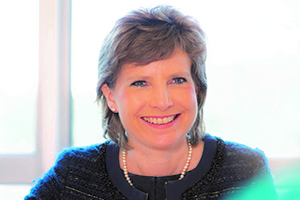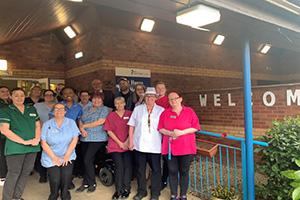Influential homecare CEO spells out the scale of crisis in the sector
Increased demand, a recruitment crisis, poor pay and repeated failures to meet the needs of the most vulnerable members of society are some of the major issues hampering the provision of homecare, according to a leading figure in the sector.
Dr Jane Townson, CEO of the Homecare Association, fears people are being ‘neglected in the community’ because of problems impacting the sector.
Around 1 million people are estimated to receive homecare in the UK, for a variety of reasons, such as post-hospital care, old age, physical disability, dementia or sensory impairment.

In a stark and honest interview with Newcross Healthcare’s Voices of Care podcast, Dr Townson, the boss of the professional association representing and supporting providers of care in people’s own homes, laid bare some of the key challenges facing the sector.
These include;
- Growing demand for homecare provision
- Carers leaving the sector in their droves
- Delays in discharging from hospital due to lack of available support at home
- Poor pay, terms and conditions hampering recruitment
- People’s needs not being met due to an increase in 15-minute visits
- Failure to make the most of digital developments
Dr Townson said: “We've got a population aging with multiple long-term conditions, and obviously the preference of most people is to stay at home surrounded by people that they love in familiar surroundings and able to do what they want when they want.
“But we're seeing staffing issues translate into problems discharging people from hospital. Nuffield Trust reported that one in four people who are stuck in hospital are waiting for homecare and then, at the front end because people are being neglected in the community, they're deteriorating, ending up in ambulances in A&E when, with some support at home, we could keep them safe and well in their own homes.”
Recent research from the Homecare Association found that the average price being paid by public organisations for home care in England after 1 April 2022 remains significantly below the cost of recruiting and retaining a skilled workforce and delivering high-quality, sustainable home care services.
Meanwhile, the podcast heard how the pay rate for someone in care was once higher than someone in retail or sales, but is now much less, making the sector unattractive to those looking to decide their careers.
Dr Townson said poor pay, terms and conditions was impacting the quality of care people received, adding: “So many councils still purchase home care by the minute. So that puts such a lot of pressure on the care workers. They feel that they're rushing from one place to the next and they're in it because they want to make a difference to people's lives, and they want to meet people's needs. “But it's really stressful when you can't do that. And we're seeing in some areas an increase in the number of 15-minute visits. You've barely parked and got in the door and, somebody got out of their chair and then you've got to go again. It's just not enough time for the level of need that people have. So, the fundamental issue is the lack of investment.”
She also criticised the lack of investment from the government in improving the technology and digital tools available to homecare workers, describing the improvements when staff were given just basic smartphones, which made it much easier for them to communicate with each other and access services like online rotas.
When discussing solutions to the crisis, Dr Townson called for increased funding for the sector, a clearer pay structure and more flexibility when it comes to training new recruits, including the ability to train remotely.
She also called for a greater focus on multi-disciplined teams working together in the community to help those in need of care.
She said: “What we'd really like to see, are more multi-disciplinary teams on the ground, because in practice the care worker is talking to the district nurses, the social workers, the hospital staff. And then we can organise the training to support that team, that would start to make quite a big difference because then you start to get that mutual respect as well.”
She said the government’s most recent white paper, ‘People At The Heart of Care’ had left her feeling ‘optimistic’ that the need for change was recognised and some of her recommendations would be put into place.
She added: “There was a very strong element of a vision that was about keeping people well at home. I think everybody sees the sense of doing that. The rhetoric and the funding don't quite match, but I think we're marching inexorably to that point.”
Also appearing on the podcast was Mark Story, Head of Learning Innovation at Newcross Healthcare, who said the company recognized issues around pay and was actively trying to do something to improve the situation. Its workforce receives pay 16.4% above the National Living Wage.
He explained: “It's part of our commitment to show that a career in social care or healthcare is a viable career option.
“So, as an employer, we're doing what we can, but there is more to do. But it's not just about pay. I think there is a pay element to it, but there are also other benefits that we can offer as a result of being a large employer.
“And when we come on and talk about career development and enhancing people's ability to develop their careers, then I think that plays into that mix of what we can offer the healthcare and social care staff as well.”
Hosted by healthcare expert Suhail Mirza, the podcast episode featuring Dr Jane Townson is available now alongside previous episodes in the series on various platforms including You Tube, Apple, Spotify and the Newcross Healthcare website





